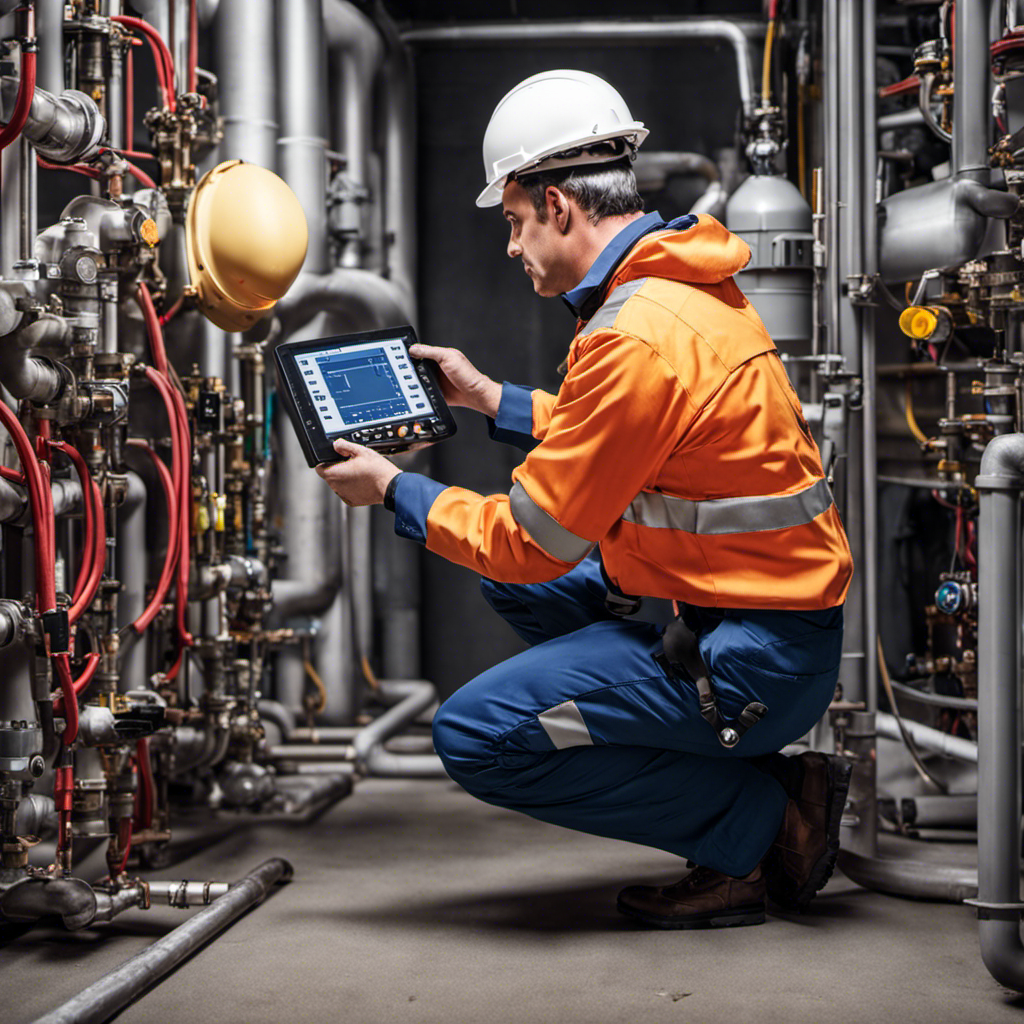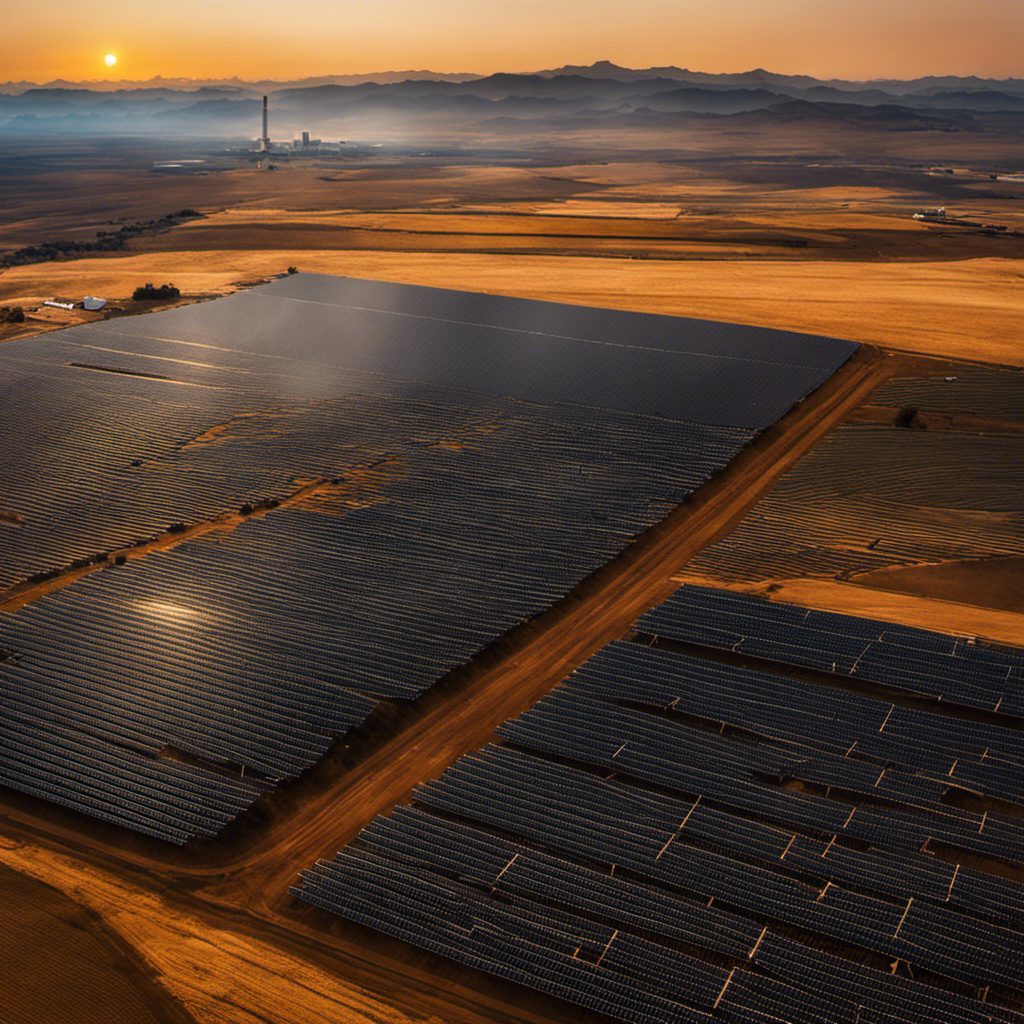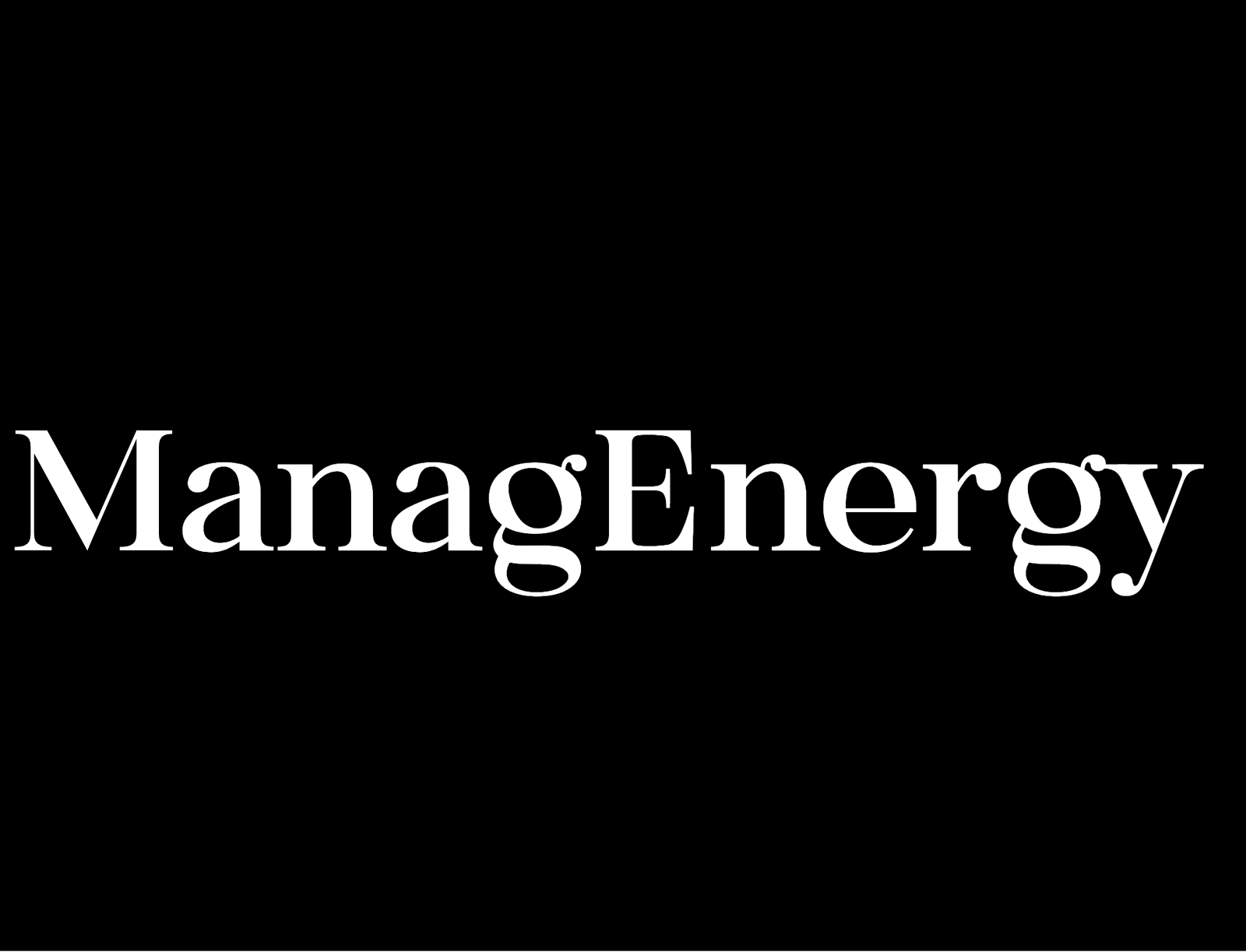Gas
Detecting and Reporting Gas Leaks: A Crucial Safety Measure

As an individual who prioritizes safety, I recognize the critical importance of identifying and reporting any gas leaks. This action is vital in averting risks such as fires, blasts, and exposure to carbon monoxide.
When it comes to managing gas lines and equipment, the responsibility lies with the company delivering the natural gas supply. If you detect the distinct odor of rotten eggs or notice blowing dirt near pipes, it’s vital to leave the area immediately and report the gas leak.
By taking quick action, we can ensure the safety of ourselves and others.
Key Takeaways
- Gas leaks can be a fire hazard and should be addressed immediately.
- The distinct odor of gas, resembling rotten eggs, is a clear indication of a gas leak.
- It is important to leave the area and call 911 if you smell gas in your home.
- Firefighters use gas monitors and carbon monoxide detectors to check for gas leaks and ensure safety.
Importance of Gas Leak Detection
I need to be aware of the importance of gas leak detection to ensure the safety of myself and my family. Gas leak awareness is crucial because gas leaks can pose serious risks to our health and safety.
It is essential to be knowledgeable about gas leak emergency procedures to respond effectively in case of a leak. If I detect the smell of gas in my home, the first step is to leave immediately and move to a safe distance away from the area. I should avoid sparking a fire or using any electrical devices.
The next step is to call 911 and report the gas leak. It is important not to ignore the odor of gas, as it can lead to explosions and carbon monoxide poisoning.
Common Causes of Gas Leaks
One common cause of gas leaks is faulty or damaged gas lines or equipment. It is important to be aware of gas leak detection methods and the importance of gas leak awareness. Here are four key points to consider:
-
Regular Maintenance: Regularly inspect and maintain gas lines and equipment to ensure they are in good working condition. This includes checking for any signs of damage, such as corrosion or leaks.
-
Gas Detectors: Install gas detectors in your home or workplace to quickly detect any gas leaks. These detectors can provide an early warning and help prevent potential accidents.
-
Educate Yourself: Familiarize yourself with the signs of a gas leak, such as a strong odor of rotten eggs, hissing or roaring noises, or blowing dirt or bubbling water near pipes. Knowing what to look for can help you identify a gas leak promptly.
-
Prompt Reporting: If you suspect a gas leak, it is crucial to report it immediately. Contact your local gas company or emergency services to ensure prompt action is taken. Ignoring a gas leak can have serious consequences, so it is better to be safe and report any suspicions.
Signs and Symptoms of a Gas Leak
Feeling lightheaded and experiencing nausea are signs of a potential gas leak. Gas leaks are hazardous and require immediate attention.
To ensure gas leak prevention and practice gas leak safety measures, it is crucial to be aware of the signs and symptoms. Apart from lightheadedness and nausea, other indicators include a strong smell of rotten eggs, hissing or roaring noises, and blowing dirt or bubbling water near pipes.
If you detect any of these signs, take immediate action. Leave the area and call 911. It is important to prioritize your safety and the safety of others by not sparking any fires or using electrical switches as they can ignite the gas.
Gas leaks are rare but can have severe consequences, so it is essential to report them promptly and follow the necessary precautions.
Steps to Take if You Suspect a Gas Leak
When suspecting a gas leak, leave the area immediately and call 911 for assistance. Taking cautionary measures and following emergency protocols is crucial in ensuring safety. Here are the steps to take if you suspect a gas leak:
-
Evacuate: Move to a safe distance away from the area to avoid any potential fire hazards or explosions.
-
Do not ignite anything: Avoid sparking a fire by refraining from using any electrical devices, matches, or lighters.
-
Call 911: Report the gas odor to emergency services as soon as possible. This will allow firefighters to respond faster and mitigate the situation.
-
Wait for professional assistance: Do not attempt to fix the leak yourself. Wait for trained professionals from the gas company to arrive and handle the situation.
The Role of Firefighters in Gas Leak Response
As a firefighter, my role in responding to gas leaks is to use a gas monitor to check for leaks, evacuate the area, and ensure the safety of everyone involved.
Gas leak awareness campaigns have been instrumental in educating the public about the importance of reporting gas leaks promptly. These campaigns emphasize the potential dangers of gas leaks, such as fire hazards and carbon monoxide poisoning.
Advancements in gas leak detection technology have significantly improved our ability to identify and mitigate these hazards. We now have access to more sophisticated gas monitors that can detect even the smallest leaks, allowing us to take immediate action.
This technology has greatly enhanced our effectiveness in responding to gas leaks and ensuring the safety of both responders and the public.
Using Gas Monitors to Detect Gas Leaks
Using a gas monitor allows me to quickly identify and address potential gas leaks, ensuring the safety of everyone involved. Gas leak detection techniques are crucial in maintaining a safe environment and preventing accidents.
Here are four important reasons why gas leak awareness is of utmost importance:
-
Early Detection: Gas monitors provide real-time data, allowing me to detect leaks at the earliest stage. This enables prompt action to prevent escalation and potential hazards.
-
Personal Safety: Gas leaks can lead to explosions or carbon monoxide poisoning, posing a significant risk to individuals. By using a gas monitor, I can ensure the safety of myself and others by promptly evacuating the area and alerting the necessary authorities.
-
Property Protection: Gas leaks can cause extensive damage to properties if left undetected. By utilizing a gas monitor, I can mitigate the risk of property damage by identifying and addressing leaks before they escalate.
-
Environmental Impact: Gas leaks contribute to environmental pollution and can have detrimental effects on ecosystems. By proactively detecting and addressing leaks, I can minimize the environmental impact and promote sustainability.
Evacuation Procedures for Gas Leak Emergencies
I can ensure the safety of myself and others during a gas leak emergency by following proper evacuation procedures. Evacuating quickly and efficiently is crucial in preventing potential explosions and carbon monoxide poisoning.
Here are the steps I would take:
-
Detect the Gas Leak: Pay attention to the distinct odor of rotten eggs, listen for hissing or roaring noises, and look for blowing dirt or bubbling water near pipes or appliances.
-
Alert Others: Immediately notify everyone in the vicinity about the gas leak to ensure their safety.
-
Leave the Area: Move to a safe distance away from the source of the gas leak. Avoid using any electrical devices, lighting matches, or creating sparks that could ignite the gas.
-
Call for Help: Dial emergency services (911) to report the gas leak. Provide them with your location and any relevant information about the situation.
How to Perform the Bubble Test for Gas Leaks
To perform the bubble test for gas leaks, simply mix soap and water and apply the solution to the suspected area. This technique is one of the most common gas leak detection techniques used by homeowners and professionals alike. Here’s how it works:
-
Prepare the solution by mixing equal parts of liquid soap and water in a spray bottle or container.
-
Apply the solution to the suspected area where the gas leak might be occurring.
-
Watch closely for any bubbles forming on the surface. If there is a gas leak, the escaping gas will cause the solution to form bubbles.
-
If you see bubbles forming, it is crucial to immediately report the gas leak to the appropriate authorities. The importance of immediate gas leak reporting cannot be overstated, as gas leaks can pose significant risks to both property and personal safety.
Identifying Gas Leaks: Listening for Hissing Noises
Listening for hissing noises is an effective way to identify potential gas leaks in your home. When it comes to gas leak detection methods, being vigilant and aware of any unusual sounds is crucial. Gas leaks can pose serious risks, from fire hazards to explosions and carbon monoxide poisoning. To ensure gas leak emergency preparedness, it’s important to pay attention to your surroundings and be familiar with the distinct odor of natural gas, which resembles rotten eggs. Additionally, keep an eye out for blowing dirt or bubbling water near pipes or appliances. If you detect any hissing or roaring noises, it could indicate a gas leak, and you should leave the area immediately and call 911. Remember, taking quick action can help prevent dangerous situations and protect yourself and your loved ones.
| Gas Leak Detection Methods | Gas Leak Emergency Preparedness |
|---|---|
| Listening for hissing noises | Be vigilant and aware |
| Recognizing the distinct odor | Leave the area immediately |
| Noticing blowing dirt or bubbling water | Call 911 for assistance |
Recognizing the Odor of Natural Gas
Being familiar with the distinct odor of natural gas is essential for recognizing a potential gas leak. Here are four reasons why reporting gas leaks is of utmost importance and understanding the potential hazards they pose:
-
Fire Hazard: Gas leaks can be a fire hazard if not addressed quickly. Ignoring a gas leak can lead to explosions and carbon monoxide poisoning. It is crucial to report any gas odor immediately to allow firefighters to respond faster and ensure the safety of yourself and your family.
-
Prompt Response: Fire departments rely on phone calls, emergency notification systems, and public alerts to respond to gas leaks promptly. Reporting a gas leak ensures that professionals can check for gas leaks using specialized equipment and evacuate the area if necessary.
-
Health Risks: Gas leaks can release harmful chemicals, including carbon monoxide, which is odorless and colorless. Breathing in these chemicals can lead to serious health issues. Reporting a gas leak helps prevent potential health hazards and ensures the well-being of everyone in the vicinity.
-
Preventing Further Damage: Gas leaks can cause property damage and disruption to services. By reporting a gas leak, you enable the gas company to take immediate action and prevent further damage to your property and the surrounding area.
Recognizing the importance of reporting gas leaks and understanding the potential hazards they present is crucial for maintaining a safe environment for yourself and your community.
Reporting a Gas Leak to Your Local Gas Company
When I smell the distinct odor of natural gas in my home, I should immediately leave the area and call my local gas company for assistance. Reporting a gas leak is of utmost importance for the safety of myself and others.
By contacting emergency services, such as the fire department, I can ensure that professionals with the necessary equipment and expertise will respond promptly. Ignoring a gas leak can lead to disastrous consequences, including explosions and carbon monoxide poisoning.
Firefighters use gas monitors to detect leaks and evacuate the area to prevent any potential hazards. It is crucial to remember that natural gas is colorless and odorless, but a chemical called mercaptan gives it a distinctive smell.
Therefore, if I ever detect the smell of gas, I must prioritize my safety and report the leak immediately.
Gas Leak Safety Measures for Homes
If I ever smell gas in my home, I must prioritize my well-being and take immediate action. Gas leaks can be extremely dangerous, so it’s crucial to detect and report them promptly. Here are some important gas leak prevention tips:
-
Install a gas detector: A gas detector can alert you to the presence of gas in your home, giving you an early warning to evacuate and call for help.
-
Regular maintenance: Schedule regular inspections and maintenance for your gas appliances, such as your furnace or stove. This can help identify and fix any potential gas leaks before they become a hazard.
-
Be mindful of the signs: Familiarize yourself with the signs of a gas leak, such as a rotten egg odor, blowing dirt or bubbling water near pipes, and hissing or roaring noises. If you notice any of these signs, evacuate the area immediately and contact your local gas company.
-
Educate yourself: Learn about the importance of gas leak detection and prevention. Understand the steps to take in case of a gas leak, such as leaving your home and calling for emergency assistance.
Gas Leak Prevention Tips
I prioritize my well-being by installing a gas detector in my home to receive early warnings of any potential gas presence.
Along with this proactive measure, I also follow a gas leak maintenance checklist to ensure the safety of my household. This includes regularly inspecting gas appliances for any signs of wear or damage, such as loose connections or corrosion.
I also make sure to keep the area around gas appliances clear of any flammable materials.
In addition to these preventive measures, I stay updated on the latest gas leak detection technology advancements. This allows me to take advantage of new technologies that provide even more accurate and reliable gas leak detection.
Gas Leak Response: What to Do While Waiting for Help
While waiting for help during a gas leak, it is important to evacuate the area and ensure the safety of yourself and others. Here are some safety precautions to follow during a gas leak response:
-
Call Emergency Contacts: Immediately contact your local gas company or emergency services, such as 911, to report the gas leak. They have the expertise and resources to handle the situation safely and efficiently.
-
Shut Off Gas Supply: If it is safe to do so, turn off the gas supply to your home or building. Locate the main gas valve and turn it clockwise to shut off the gas flow. This will help prevent further leakage and reduce the risk of fire or explosion.
-
Do Not Use Ignition Sources: While waiting for help, avoid using anything that can create a spark or ignite the gas, such as matches, lighters, or electrical appliances. Even a small spark can trigger a catastrophic event.
-
Stay Outside and Await Assistance: Once you have evacuated the area, do not re-enter the premises until the gas company or emergency personnel have deemed it safe. Stay at a safe distance and wait for their arrival.
The Dangers of Ignoring Gas Leaks
Ignoring a gas leak can lead to catastrophic consequences, including explosions and carbon monoxide poisoning. Gas leaks can occur due to various causes such as faulty appliances, damaged gas lines, or poor installation.
It is crucial to prevent gas leaks by taking necessary precautions. Regular maintenance and inspection of gas appliances and lines can help identify any potential issues before they escalate. Ensuring proper ventilation and using gas detectors can also aid in detecting leaks early on.
Additionally, it is important to educate oneself and family members about the distinct odor of natural gas, which resembles rotten eggs. If you suspect a gas leak, evacuate the area immediately and contact your local gas company or emergency services. Remember, prompt action is essential to ensure the safety of yourself and those around you.
Frequently Asked Questions
Can Gas Leaks Cause Carbon Monoxide Poisoning?
Yes, gas leaks can cause carbon monoxide poisoning. Gas leak detection methods are crucial to prevent this health risk.
When gas leaks occur, carbon monoxide, a colorless and odorless gas, can be released. Breathing in high levels of carbon monoxide can lead to symptoms like headaches, dizziness, nausea, and even death.
It is important to be aware of the signs of a gas leak and take immediate action to ensure safety.
How Can I Contact My Local Gas Company to Report a Gas Leak?
To contact my local gas company and report a gas leak, I would immediately leave my home and move to a safe distance away from the area.
Then, I would call 911 to inform emergency services about the gas leak. It’s crucial to avoid sparking a fire and wait for the professionals to handle the situation.
Gas leak detection equipment, such as gas monitors and carbon monoxide detectors, are used by firefighters to ensure safety and evacuate the area if necessary.
What Should I Do if I Detect the Smell of Gas in My Home?
If I detect the smell of gas in my home, the first thing I should do is prioritize my safety and the safety of my family. I would immediately leave the area and call 911 to report the gas leak.
Gas leaks can be extremely dangerous, so it’s crucial to take them seriously. Regular gas leak inspections are also important to prevent such incidents.
Various gas leak detection methods, such as using a gas monitor and checking for blowing dirt or bubbling water near pipes, can help ensure our safety.
Are Gas Leaks Common or Rare?
Gas leaks are rare but dangerous. They can happen due to faulty equipment or damaged pipelines. It’s crucial to be aware of the signs of a gas leak.
Look out for the distinct odor of rotten eggs, blowing dirt or bubbling water near pipes, and hissing or roaring noises. If you detect the smell of gas in your home, leave immediately and call 911.
Ignoring a gas leak can lead to explosions and carbon monoxide poisoning.
How Do Firefighters Check for Gas Leaks and Ensure Safety?
Firefighters ensure safety by receiving specialized training and using advanced gas leak detection equipment. They are equipped with gas monitors that can detect the presence of gas in the air. These devices provide real-time readings, allowing firefighters to identify and locate gas leaks quickly.
Additionally, they use carbon monoxide detectors to ensure the air quality is safe. By being well-prepared and utilizing their equipment effectively, firefighters can effectively detect and respond to gas leaks, minimizing the risk of explosions and carbon monoxide poisoning.
Conclusion
In conclusion, detecting and reporting gas leaks is a crucial safety measure that should never be taken lightly. The potential dangers of gas leaks, such as explosions and carbon monoxide poisoning, highlight the importance of swift action.
One example that highlights this is the case of a family who detected a gas leak in their home and immediately reported it. Firefighters were able to respond quickly and safely evacuate the family, preventing a potential disaster. This emphasizes the vital role that reporting gas leaks plays in saving lives and protecting communities.
It is essential for everyone to be aware of the signs and symptoms of a gas leak and to take immediate action if one is suspected. Remember, your quick action can make a significant difference in preventing a tragedy.
Gas
Stay Safe: Reporting the Smell of Gas for Immediate Action

As I entered my home, a strong, unpleasant scent struck me – the clear aroma of gas. A wave of fear washed over me as I grasped the peril before me. Without a second thought, I quickly called 911, recognising that alerting them to the presence of gas could potentially save lives.
The importance of taking immediate action cannot be overstated. By contacting the Fire Department, they can respond swiftly to prevent a potential disaster. It’s crucial to recognize the warning signs, evacuate the area, and ensure everyone’s safety.
Stay safe and report the smell of gas for immediate action.
Key Takeaways
- Calling 911 and reporting to the Fire Department is crucial when there is a smell of gas in a building or home to prevent the situation from escalating into an emergency.
- Providing your name, address, and phone number when calling 911 helps verify your identity and prioritize the response from life-saving responders.
- Signs of a gas leak include bubbles in standing water, discolored vegetation, a rotten egg odor, or listening for a hissing sound indicating gas escaping from a pipe or appliance.
- It is important to call your utilities immediately when a gas leak occurs and to settle any overdue charges before moving into a new house to ensure safety and avoid late fees.
The Importance of Immediate Action
It’s crucial for me to take immediate action and report the smell of gas to ensure the safety of myself and others. The consequences of inaction can be severe, as a gas leak can quickly escalate into an emergency situation.
By reporting the smell of gas, I am helping to prevent potential disasters and protect lives. Preparedness is key when it comes to dealing with gas leaks. Being aware of the signs of a gas leak, such as a rotten egg odor or hissing sounds, can help me identify the problem and take the necessary precautions.
Calling 911 and the Fire Department is essential, as they have the expertise and resources to handle gas-related emergencies. By taking immediate action and reporting the smell of gas, I am prioritizing the safety and well-being of everyone involved.
Recognizing the Smell of Gas
I can detect the odor of natural gas by recognizing the distinct smell of rotten eggs. It’s important to be able to identify this smell as it can indicate a potential gas leak.
Here are three key safety precautions to keep in mind when it comes to gas leak detection:
-
Trust your sense of smell: If you notice a strong odor of rotten eggs or sulfur, it could be a sign of a gas leak. This distinctive smell is purposely added to natural gas to help people identify leaks.
-
Take immediate action: If you smell gas, it’s crucial to take immediate action. Leave the area immediately and avoid using any electrical devices, as they can potentially spark and ignite the gas. Once you are in a safe location, call 911 or your local emergency number to report the gas leak.
-
Don’t try to fix it yourself: It’s important to leave the gas leak detection and repair to the professionals. Attempting to fix a gas leak on your own can be dangerous and potentially worsen the situation. Instead, rely on trained technicians who have the knowledge and equipment to handle gas leaks safely.
The Role of Calling 911
When smelling natural gas, it is crucial to leave the area immediately and call 911. This ensures the safety of myself and others.
The emergency response process begins when the call is routed to the Public Safety Answering Point (PSAP). At the PSAP, basic questions are asked to prioritize the incident and send life-saving responders.
Providing my name, address, and phone number helps verify my identity and prioritize the response.
Reporting procedures and protocols dictate that I report the smell of gas to the Fire Department due to the potential danger of gas leaks.
Signs of a gas leak include bubbles in standing water, discolored vegetation, and a rotten egg odor. Listening for a hissing sound indicates gas escaping from a pipe or appliance.
The Fire Department will assess the situation and take action if necessary.
Following these reporting procedures and protocols is essential for a prompt and effective response to the smell of gas.
Contacting the Fire Department
Contacting the Fire Department is crucial in situations where there is a potential gas leak, as they have the expertise to assess and address the issue effectively. Here are three reasons why contacting emergency services, specifically the Fire Department, is important when dealing with a gas leak:
-
Quick Response Time: The Fire Department is trained to respond promptly to emergency situations. They understand the urgency of gas leaks and will prioritize their response to ensure the safety of everyone involved.
-
Expertise and Equipment: Firefighters have the knowledge and tools to handle gas leaks safely. They can assess the situation, identify the source of the leak, and take appropriate action to mitigate the risk.
-
Preventing Further Damage: Gas leaks can be highly dangerous and even lead to explosions or fires. By contacting the Fire Department, you can prevent the situation from escalating and potentially save lives.
Alerting Your Utilities
Notifying the utility company about a potential gas leak is crucial for ensuring the safety of everyone in the area. Gas leak prevention and reporting procedures are essential for immediate action.
If you suspect a gas leak, it’s important to contact your utility company right away. They have the expertise and resources to handle the situation effectively. When reporting the potential gas leak, provide them with accurate information such as your name, address, and a description of the smell or any other signs you have noticed.
Following their instructions, evacuate the area and wait for further instructions. It’s important to prioritize safety and let the professionals handle the situation.
Signs of a Gas Leak
After alerting my utilities about a gas leak, it’s crucial to be aware of the signs that indicate a gas leak. Gas leaks can be extremely dangerous if not detected and addressed promptly. Here are three important signs of a gas leak to watch out for:
-
Unusual odor: One of the most common signs of a gas leak is a strong, rotten egg odor. Natural gas is odorless, but an additive called mercaptan is added to make it easily detectable. If you smell this distinct odor in your home or surrounding areas, it’s a clear indication of a gas leak.
-
Hissing sound: Another sign of a gas leak is a hissing sound coming from a pipe or appliance. This sound is caused by the gas escaping. If you hear this sound, it’s important to take immediate action to prevent any potential hazards.
-
Physical symptoms: Gas leaks can also cause physical symptoms such as dizziness, nausea, headaches, or difficulty breathing. If you or anyone in your household experiences these symptoms, it’s crucial to evacuate the area and seek medical attention.
Being vigilant and recognizing these signs of a gas leak can help prevent accidents and ensure the safety of yourself and those around you.
Evacuation and Police Involvement
Evacuating the area immediately and calling the police is crucial when experiencing the signs of a gas leak. Safety should always be the top priority in such situations.
Following proper evacuation protocols helps ensure everyone’s well-being and allows emergency responders to take necessary actions swiftly. When evacuating, it is important to remain calm and alert others in the vicinity of the potential danger.
Once in a safe location, promptly dial emergency services to report the gas leak and provide them with accurate information. Emergency response teams are trained to handle these situations and will take immediate action to mitigate the risks.
Health Symptoms and Gas Leaks
Experiencing health symptoms such as breathing difficulties, headaches, or nausea could indicate a potential gas leak, and it’s important to take them seriously. Gas leaks can pose significant health risks and should be prevented to ensure the safety of individuals and the environment.
Here are three important points to consider for gas leak prevention and minimizing health risks:
-
Regular maintenance: Schedule regular inspections and maintenance for gas appliances and pipelines to identify and fix any potential leaks. This proactive approach can help prevent gas leaks before they occur.
-
Proper ventilation: Ensure that gas-fueled appliances, such as stoves and water heaters, are properly ventilated. Good ventilation helps to minimize the accumulation of gas and reduces the risk of leaks.
-
Gas detectors: Install gas detectors in your home or workplace. These devices can detect the presence of gas and alert you to potential leaks, allowing for immediate action to be taken.
Identifying Warning Signs
I can identify warning signs of a potential gas leak by looking for bubbles in standing water, discolored vegetation, and a rotten egg odor. These signs indicate potential dangers and should not be ignored.
Bubbles in standing water can occur when gas escapes from underground pipes and rises to the surface. Discolored vegetation, such as dying or yellowing plants, can be a result of gas leaking into the soil. The rotten egg odor, caused by an additive called mercaptan, is a distinct smell associated with natural gas.
If any of these warning signs are present, it is important to take preventive measures immediately. This includes evacuating the area, calling 911, and contacting the appropriate authorities.
Gas leaks can be extremely dangerous, so it is crucial to prioritize safety and report any suspicions promptly.
Ensuring Safety: Stay Vigilant
In my previous subtopic, I discussed the importance of identifying warning signs of a gas leak. Now, let’s focus on ensuring safety by staying vigilant and understanding gas leak prevention and emergency response procedures.
Regular maintenance is crucial to prevent gas leaks. It is important to have gas appliances, pipelines, and connections regularly checked by a professional. This will help identify any potential issues and ensure everything is in proper working order.
Installing gas leak detectors in your home can provide an additional layer of safety. These detectors can quickly alert you to the presence of gas, allowing you to take immediate action and prevent a potential emergency.
Familiarize yourself with emergency response procedures in the event of a gas leak. Know how to shut off the gas supply and evacuate the area safely. Contact the appropriate authorities, such as the fire department or utility company, to report the leak and seek professional assistance.
Frequently Asked Questions
What Are Some Common Health Symptoms That May Indicate a Gas Leak or Air Contaminant?
Common gas leak symptoms include breathing difficulties, headaches, and nausea. These health effects may indicate a gas leak or air contaminant. It is important to evacuate the area immediately and call the appropriate authorities, such as the utility company or 911.
Persistent symptoms should not be ignored and may require immediate action. Stay vigilant and prioritize your safety when encountering a potential gas leak or air contaminant.
Can the Smell of Gas Be Present Even if There Are No Other Warning Signs?
Yes, the smell of gas can be present even if there are no other warning signs. It’s important to remember that gas leaks can be dangerous and should never be ignored.
If you detect the smell of gas, it is crucial to report it immediately to ensure the safety of yourself and others. Gas leak detection and reporting play a vital role in preventing potential emergencies and allowing prompt action to be taken.
How Quickly Should I Evacuate the Area if I Smell Gas?
If I smell gas, I need to evacuate the area immediately. Evacuation time is crucial when it comes to gas leaks. The faster I leave, the safer I’ll be.
Once I’m in a safe location, I should call 911 to report the gas leak. The response to a gas leak is swift and efficient, so it’s important to notify the authorities as soon as possible.
What Should I Do if I Suspect a Gas Leak but I’m Unsure if It’s an Emergency Situation?
If I suspect a gas leak but I’m unsure if it’s an emergency situation, there are steps I can take to assess the situation and take appropriate action.
First, I should ensure my safety by evacuating the area immediately if I smell gas.
Then, I can try to identify the source by checking for signs like hissing sounds, discolored vegetation, or a rotten egg odor.
If I’m still unsure, it’s best to err on the side of caution and call 911 or the Fire Department for further guidance.
Are There Any Precautions I Should Take While Waiting for Emergency Responders to Arrive?
While waiting for emergency responders to arrive during a gas leak evacuation, it’s important to prioritize safety.
Firstly, evacuate the area immediately and move to a safe location away from the source of the gas. Avoid using any electrical devices or open flames, as they can ignite the gas.
Additionally, do not attempt to fix the leak yourself. Instead, wait for the professionals to assess and handle the situation.
Conclusion
In conclusion, when it comes to the smell of gas, time is of the essence. Don’t hesitate, call 911 immediately. Your swift action can prevent a potential disaster and save lives.
Remember, the Fire Department is there to help, so reach out to them as well.
Stay vigilant and be aware of warning signs such as discolored vegetation or a rotten egg odor. By taking these steps, you can ensure your safety and the safety of those around you.
Stay safe, stay proactive.
Gas
Clean and Efficient Power Generation: Gas-Fired Plants

I’m thrilled to introduce to you the remarkable advantages of generating power through gas combustion.
Did you know that gas-fired power plants emit fewer pollutants and have a smaller global warming impact compared to coal or oil-fired power plants? That’s just the beginning.
These plants are not only cost-effective and easily transportable, but they also capture waste heat to improve efficiency through cogeneration.
In this article, we will delve into the advantages, types, efficiency comparison, environmental benefits, work hazards, and environmental footprint of gas-fired power generation.
Let’s explore this clean and efficient method of generating electricity together.
Key Takeaways
- Gas-fired power plants are a cost-effective and flexible source of electricity, utilizing natural gas as a cheaper and easily transportable fuel.
- These plants are up to twice as efficient as coal or oil-fired power plants, resulting in lower carbon dioxide emissions and improved air quality.
- Waste heat from the combustion process can be captured through cogeneration, enhancing efficiency and providing energy for heating and industrial processes.
- Despite being cleaner than coal-burning facilities, gas-fired power plants still pose unique safety hazards and require proper training and protective measures for workers.
The Advantages of Gas-Fired Power Generation
I really like the advantages of gas-fired power generation because it is a low-cost and flexible source of electricity that produces fewer pollutants compared to coal and oil.
Gas-fired power plants have significant benefits, especially in remote areas where access to electricity is limited. The use of natural gas as a fuel allows for cheaper transportation and distribution, making it an ideal option for areas that are not easily connected to the grid.
Additionally, gas-fired power plants have a positive impact on air quality. Burning natural gas produces fewer pollutants such as sulfur dioxide, nitrogen oxides, and particulate matter, compared to coal and oil. This reduction in emissions helps improve the overall air quality, leading to better health outcomes for communities.
Overall, gas-fired power generation provides a cost-effective and environmentally friendly solution, particularly in remote areas.
Types of Gas-Fired Power Plants
Peaking power plants in the gas-fired power industry produce electricity during high demand times. These plants are crucial for meeting the fluctuating electricity needs of consumers. Advancements in technology are shaping the future of gas-fired power plants. Here are four key areas to watch for future advancements:
-
Gas turbine efficiency: Improving the efficiency of gas turbines can result in higher power output and reduced fuel consumption. This makes gas-fired power plants more cost-effective and environmentally friendly.
-
Carbon capture and storage: Developing technologies to capture and store carbon dioxide emissions from gas-fired power plants can help mitigate their environmental impact. It also contributes to global efforts to reduce greenhouse gas emissions.
-
Combined heat and power systems: Integrating gas-fired power plants with cogeneration systems maximizes energy efficiency. This is done by utilizing waste heat for heating and industrial processes, reducing overall energy consumption.
-
Grid integration and flexibility: Enhancing the integration of gas-fired power plants with renewable energy sources and implementing advanced grid management systems optimizes power generation. It improves system reliability and supports the transition to a more sustainable energy mix.
These advancements hold the potential to make gas-fired power plants even more efficient, reliable, and environmentally friendly. This ensures a cleaner and more sustainable future for the gas-fired power industry.
Efficiency Comparison: Gas Vs. Coal and Oil
Comparing the efficiency of natural gas to coal and oil, natural gas produces fewer pollutants and emits less carbon dioxide during combustion. Gas-fired power plants are up to twice as efficient as coal or oil-fired power plants. This higher efficiency translates to reduced greenhouse gas emissions and a smaller environmental footprint.
However, when it comes to renewable energy sources, gas-fired power plants still have room for improvement. While they are cleaner than coal-burning facilities, they do emit carbon dioxide. To further reduce greenhouse gas emissions in gas-fired plants, integrating renewable energy sources such as solar or wind power into the energy mix can be beneficial.
This combination would not only increase overall efficiency but also contribute to a more sustainable and environmentally friendly power generation system.
Environmental Benefits of Gas-Fired Power Generation
Reducing greenhouse gas emissions and improving air quality, natural gas combustion in power plants emits fewer pollutants compared to coal and oil. Here are four key benefits of gas-fired power plants compared to other fossil fuels and the impact they have on air quality:
-
Lower carbon dioxide emissions: Gas-fired power plants emit 50% less carbon dioxide during combustion compared to coal-fired power plants, reducing the greenhouse effect and global warming impact.
-
Reduced sulfur dioxide emissions: Natural gas combustion results in minimal sulfur dioxide emissions, minimizing the formation of acid rain and improving air quality.
-
Lower nitrogen oxide emissions: Gas-fired power plants produce significantly fewer nitrogen oxides, which are major contributors to smog and respiratory issues.
-
Decreased particulate matter emissions: Compared to coal and oil, gas-fired power plants release fewer particulate matter pollutants, resulting in cleaner air and better overall public health.
Harnessing Waste Heat: Cogeneration in Gas-Fired Plants
Using waste heat in gas-fired power plants through cogeneration is a cost-effective way to increase efficiency and reduce environmental impact. Cogeneration, also known as combined heat and power (CHP), allows for the simultaneous production of electricity and useful heat from the same fuel source. This process utilizes the waste heat generated during power generation to provide heating and industrial processes, resulting in significant energy savings and reduced greenhouse gas emissions.
By incorporating cogeneration in gas-fired power plants, the overall efficiency of the system can be increased up to 80%, compared to around 40% for standalone power generation. This means that more energy is extracted from the fuel, resulting in lower fuel consumption and reduced carbon dioxide emissions. Additionally, the waste heat utilized in cogeneration can replace the need for separate heating systems, further reducing energy consumption and costs.
The following table highlights the benefits of cogeneration in gas-fired power plants:
| Cogeneration Benefits | Waste Heat Utilization |
|---|---|
| Increased Efficiency | Reduced Energy Waste |
| Lower Fuel Consumption | Cost Savings |
| Reduced CO2 Emissions | Environmental Impact |
Maximizing Efficiency: Energy Conservation and Demand-Response Options
Maximizing efficiency in gas-fired power plants involves implementing energy conservation and demand-response options to optimize resource utilization and reduce energy waste. By implementing energy conservation strategies and demand response programs, gas-fired power plants can achieve higher levels of efficiency and reduce their environmental impact.
Here are four key ways to maximize efficiency in gas-fired power plants:
-
Utilizing advanced control systems: Implementing advanced control systems can optimize the operation of gas-fired power plants, ensuring that resources are used efficiently and effectively.
-
Upgrading equipment and technology: Investing in modern and efficient equipment and technology can significantly improve the overall efficiency of gas-fired power plants.
-
Implementing energy management systems: Energy management systems allow power plant operators to monitor and control energy usage in real-time, enabling them to make adjustments and optimize energy consumption.
-
Participating in demand-response programs: By participating in demand-response programs, gas-fired power plants can adjust their electricity generation based on demand fluctuations, reducing the need for additional power generation and improving overall efficiency.
Safety Considerations in Gas-Fired Power Plants
Working in gas-fired power plants requires proper training and the necessary personal protective equipment (PPE) to ensure safety and prevent injuries or fatalities. Safety regulations and risk assessment play a crucial role in maintaining a safe working environment. The table below highlights some of the key safety considerations in gas-fired power plants:
| Safety Considerations | Description |
|---|---|
| Heavy Equipment Hazards | Gas-fired power plants involve heavy machinery, posing risks of accidents and injuries. |
| Noise and Explosion Risks | Gas turbines are housed in acoustic enclosures to reduce noise and minimize the risk of explosions. |
| Fire Protection Systems | Proper fire protection systems are essential to prevent gas leaks and fires in turbine compartments. |
| Training and PPE | Workers should receive proper training and be equipped with the necessary personal protective equipment (PPE) to reduce injuries and fatalities. |
| Ongoing Risk Assessment | Regular risk assessments should be conducted to identify and mitigate potential hazards in the plant. |
Acoustic Enclosures: Reducing Noise and Explosion Risks
I find that acoustic enclosures are an effective way to reduce noise and minimize the risk of explosions in gas-fired power plants. The use of these enclosures is crucial in ensuring the safety and well-being of workers, as well as mitigating the impact on the surrounding environment.
Here are four key points to consider:
-
Noise Reduction: Acoustic enclosures are designed to absorb and dampen sound waves generated by the gas turbines, reducing noise levels to acceptable limits. This is particularly important in densely populated areas where noise pollution can be a significant concern.
-
Explosion Risk Mitigation: Gas-fired power plants involve the use of flammable gases, which can pose a risk of explosions if not properly contained. Acoustic enclosures provide a physical barrier that helps contain any potential explosions, minimizing the risk of damage to equipment and injury to personnel.
-
Environmental Impact: By reducing noise levels, acoustic enclosures contribute to minimizing the environmental impact of gas-fired power generation. Excessive noise can disrupt local ecosystems, disturb wildlife, and impact nearby communities. The use of these enclosures helps maintain a harmonious coexistence with the environment.
-
Regulatory Compliance: Many countries have regulations in place to limit noise pollution and ensure the safety of workers. Acoustic enclosures play a crucial role in meeting these regulatory requirements, allowing gas-fired power plants to operate in compliance with local laws and regulations.
Fire Protection Systems in Gas-Fired Power Plants
To ensure the safety of personnel and equipment, fire protection systems are an integral part of gas-fired power plants. These systems are designed to detect and suppress fires, as well as detect gas leaks that could potentially lead to fires.
Fire suppression systems typically include automatic sprinklers, fire alarms, and fire extinguishers strategically placed throughout the plant. These systems are equipped with advanced technology that can quickly detect the presence of smoke or heat and activate the appropriate response, such as releasing water or chemical agents to extinguish the fire.
Gas leak detection systems, on the other hand, use sensors to monitor the plant for any signs of gas leaks. These systems can provide an early warning, allowing operators to take immediate action to mitigate the leak and prevent a potential fire.
Overall, the implementation of fire protection systems and gas leak detection systems in gas-fired power plants plays a crucial role in ensuring the safety of personnel and protecting valuable equipment.
Training and Personal Protective Equipment (PPE) for Workers
Trained personnel in gas-fired power plants are equipped with the necessary personal protective equipment (PPE) to mitigate safety hazards. Here are four key points to consider regarding training effectiveness and PPE regulations and standards:
-
Training Effectiveness: Proper training is essential to ensure that workers understand the potential risks and hazards associated with gas-fired power plants. This includes training on the safe operation of equipment, emergency procedures, and the proper use of PPE. Regular training updates and evaluations help ensure that workers are up-to-date on the latest safety protocols.
-
PPE Regulations and Standards: Gas-fired power plants must adhere to specific regulations and standards when it comes to PPE. This includes requirements for respiratory protection, eye and face protection, protective clothing, and fall protection. Compliance with these regulations helps minimize the risk of injuries and fatalities in the workplace.
-
PPE Selection: The selection of appropriate PPE is crucial to effectively protect workers. Factors such as the type of hazard, level of exposure, and specific job tasks should be considered when choosing PPE. This ensures that workers have the right equipment to mitigate potential risks.
-
PPE Maintenance and Replacement: Regular inspection, maintenance, and replacement of PPE are necessary to ensure its effectiveness. PPE should be inspected before each use, properly cleaned and stored, and replaced when damaged or expired. This helps maintain the integrity of the equipment and ensures worker safety.
Addressing Work Hazards in Gas-Fired Power Plants
Addressing work hazards in gas-fired power plants requires implementing comprehensive safety protocols and providing workers with the necessary personal protective equipment (PPE).
Worker training plays a crucial role in reducing the environmental impact of these power plants. By educating workers on proper safety procedures and environmental regulations, they can actively contribute to minimizing hazards and mitigating risks. This includes training on handling hazardous materials, operating equipment safely, and responding to emergencies.
Additionally, workers should be equipped with the appropriate PPE, such as protective clothing, gloves, and respiratory devices, to protect themselves from potential hazards.
The Environmental Footprint of Gas-Fired Power Generation
Reducing the environmental footprint of gas-fired power generation requires implementing sustainable practices and minimizing emissions. To address this, there are several key areas that need to be considered:
-
Environmental regulations for gas-fired power plants: Compliance with stringent regulations is essential to ensure that gas-fired power plants operate within acceptable environmental limits. This includes monitoring and controlling emissions of pollutants such as carbon dioxide, sulfur dioxide, nitrogen oxides, and particulate matter.
-
Renewable energy alternatives to gas-fired power generation: Exploring and investing in renewable energy sources like solar, wind, and hydroelectric power can help reduce the reliance on gas-fired power generation. These alternatives produce clean energy with minimal environmental impact and can contribute to a more sustainable energy mix.
-
Energy efficiency and conservation: Improving the efficiency of gas-fired power plants through technological advancements and operational optimization can lead to significant reductions in greenhouse gas emissions. Additionally, promoting energy conservation practices among consumers can help reduce overall energy demand and the need for additional gas-fired power generation.
-
Carbon capture and storage (CCS): Implementing CCS technologies can capture and store carbon dioxide emissions from gas-fired power plants, preventing them from being released into the atmosphere. This can help mitigate the environmental impact of gas-fired power generation by reducing greenhouse gas emissions.
Clean and Efficient: Gas-Fired Power Generation Overview
I believe it’s important to understand the overall process and benefits of utilizing natural gas in electricity production.
Gas-fired power generation is a clean and efficient method that plays a significant role in meeting the world’s energy needs. Gas-fired power plants offer economic viability due to the lower cost of natural gas compared to coal and oil.
These plants use a gas turbine engine to generate electricity, and there are two types: simple cycle and combined cycle.
Gas-fired power plants have a higher efficiency rate, emitting fewer carbon dioxide emissions and other pollutants compared to coal-fired plants. However, proper gas-fired power plant maintenance is crucial to ensure safe operation and prevent potential hazards.
Overall, gas-fired power generation provides a low-cost, flexible, and environmentally friendly solution for meeting electricity demand.
Future Outlook: Advancements and Challenges in Gas-Fired Power Plants
Looking ahead, advancements in technology and infrastructure will play a crucial role in enhancing the efficiency and safety of gas-fired power plants. These advancements will drive the future of gas-fired power generation and address the challenges faced by these plants.
Here are four key areas that will shape the future of gas-fired power plants:
-
Advancements in gas-fired technology: With ongoing research and development, we can expect improvements in gas turbine design, combustion efficiency, and power generation capacity. These advancements will lead to higher overall plant efficiency and reduced emissions.
-
Integration of renewable energy: Gas-fired power plants can complement renewable energy sources by providing flexible and reliable backup power. With the integration of storage technologies and smart grid systems, the power plants can efficiently balance the intermittent nature of renewables.
-
Enhanced digitalization and automation: The implementation of advanced monitoring and control systems will optimize plant operations, improve maintenance scheduling, and reduce downtime. Additionally, predictive analytics and machine learning algorithms will enable early detection of potential equipment failures, enhancing plant safety and reliability.
-
Infrastructure development: Upgrading existing infrastructure and building new pipelines and storage facilities will ensure a reliable supply of natural gas to power plants. Furthermore, investments in carbon capture and storage technologies will enable gas-fired plants to reduce their carbon footprint and contribute to a more sustainable energy future.
As we move forward, these advancements will address the future challenges in gas-fired power plants, ensuring their continued role in providing clean and efficient electricity generation.
Frequently Asked Questions
How Does Gas-Fired Power Generation Compare to Other Types of Power Generation in Terms of Efficiency and Cost?
Gas-fired power generation is known for its efficiency and cost-effectiveness compared to other types of power generation. Gas-fired plants have a higher efficiency rate, up to twice as efficient as coal or oil-fired plants. This means they can generate more electricity using less fuel, resulting in lower operating costs.
Additionally, natural gas is a cheaper fuel compared to coal, and it can be easily transported. These factors contribute to the overall cost advantage of gas-fired power generation.
What Are the Potential Environmental Impacts of Gas-Fired Power Generation, and How Do They Compare to Coal and Oil-Fired Power Plants?
The potential environmental impacts of gas-fired power generation are important to consider. Compared to coal and oil-fired plants, gas-fired plants emit fewer pollutants and have lower carbon dioxide emissions. This helps to improve air quality and reduce the global warming impact.
However, it’s essential to address potential health risks and adhere to environmental regulations. Gas-fired plants may still have a significant environmental footprint and require proper monitoring and mitigation measures to minimize their impact.
What Safety Considerations and Hazards Are Associated With Working in Gas-Fired Power Plants, and What Measures Are Taken to Mitigate These Risks?
Safety considerations and hazard mitigation are of utmost importance in gas-fired power plants. Working in such facilities involves heavy equipment and unique safety hazards.
To ensure safety, gas turbines are housed in acoustic enclosures to reduce noise and explosion risks. Proper fire protection systems are implemented to prevent gas leaks and fires in turbine compartments.
Workers receive thorough training and are provided with necessary personal protective equipment (PPE) to mitigate injuries and fatalities. Despite being cleaner than coal-burning facilities, gas-fired power plants still pose potential work hazards.
What Are the Potential Applications and Advancements in Lunar-Based Solar Power, and How Could It Be Used to Support Future Space Missions and Colonies?
Advancements in lunar-based solar power have the potential to greatly support future space missions and colonies. With lightweight and efficient solar panels, we can power lunar colonies, conduct scientific research, and enable space-based manufacturing.
Energy storage technology and wireless power transmission methods are being explored to enhance the capabilities of lunar-based solar power.
Additionally, the use of lunar regolith as a resource for solar panel production and collaboration between space agencies and private companies are driving technological advancements in this field.
What Are the Challenges and Limitations of Lunar-Based Solar Power, Including the Lack of Infrastructure and Difficulties in Transmitting Power to Earth?
The challenges and limitations of lunar-based solar power include the lack of lunar infrastructure and difficulties in transmitting power to Earth.
Without the necessary infrastructure on the Moon, establishing and maintaining lunar-based solar power systems becomes more challenging.
Additionally, transmitting power from the Moon to Earth poses technical obstacles due to the vast distance and the need for efficient and reliable transmission methods.
These challenges need to be addressed to fully harness the potential of lunar-based solar power.
Conclusion
In conclusion, gas-fired power generation stands as a beacon of clean and efficient electricity production. Its advantages, such as cost-effectiveness and transportability, make it a viable option for meeting energy demands.
With lower carbon dioxide emissions and the ability to capture waste heat through cogeneration, gas-fired power plants are environmentally friendly. However, it is important to address work hazards and minimize the environmental footprint associated with this technology.
As advancements continue to be made, the future outlook for gas-fired power plants holds promise, but challenges must be overcome to ensure sustainable and responsible energy generation.
Gas
Detecting Natural Gas Leaks: Signs, Safety Measures & Snow Hazards

I’ve consistently been captivated by the significance of natural gas and its function in our everyday lives. However, as much as I value its advantages, I also acknowledge the necessity of identifying gas leaks and putting safety first.
Did you know that natural gas leaks can be detected through the distinct smell of rotten eggs, visual evidence like bubbling water or discolored vegetation, and the presence of a hissing sound? It’s crucial to be aware of these signs and take immediate action.
In this article, we’ll explore the signs, safety measures, and even the hazards posed by snow and ice. So, let’s dive in and learn how to keep ourselves and our communities safe.
Key Takeaways
- The smell of rotten eggs is a strong indication of a natural gas leak.
- Bubbling water or discolored vegetation can be visual evidence of a gas leak.
- A hissing sound suggests the presence of a gas leak.
- National Grid adds an odorant called mercaptan to make natural gas smell like sulfur or rotten eggs, making it easy to detect when something is wrong.
Signs of Natural Gas Leaks
I can easily detect a natural gas leak by smelling the distinct odor of rotten eggs. This smell is caused by an odorant called mercaptan that is added to natural gas to make it easily detectable.
Preventing gas leak accidents is crucial because natural gas leaks can have serious health effects. When inhaled, natural gas can cause dizziness, headaches, nausea, and even unconsciousness. In high concentrations, it can be extremely flammable and lead to explosions.
It is important to be aware of the signs of a gas leak, such as the smell of rotten eggs, bubbling water or discolored vegetation in the area, and a hissing sound. If you suspect a gas leak, it is vital to evacuate the area immediately and contact the appropriate authorities to ensure your safety and the safety of others.
Safety Measures for Natural Gas Leaks
National Grid prioritizes the safety of their network and works diligently to reduce the risk of incidents. They have implemented several safety measures to prevent accidents and ensure prompt emergency response. One of their key initiatives is adding an odorant called mercaptan to natural gas, giving it a distinct smell of sulfur or rotten eggs. This makes it easier to detect gas leaks and take immediate action. National Grid also operates the Gas Occurrences program, which provides customer service and safety information to educate the public on gas safety. In the event of a gas leak, it is crucial to contact National Grid immediately, providing them with the location of the odor. They have a dedicated team that will work swiftly to fix the problem and ensure the safety of people, property, and wildlife.
| Safety Measures for Natural Gas Leaks | Description |
|---|---|
| Adding odorant to natural gas | Easy detection of gas leaks through smell |
| Gas Occurrences program | Provides customer service and safety information |
| Prompt response to gas leak reports | Swift action to fix gas leaks and ensure safety |
| Educating the public on gas safety | Creating awareness and preventing accidents |
Snow Hazards and Natural Gas Leaks
When removing snow, it is important to be cautious around gas meters and outside gas risers to prevent any potential damage. Snow hazards can pose a threat to underground pipe systems and natural gas equipment.
To prevent damage during snow removal, follow these guidelines:
- Clear snow carefully around gas meters and outside gas risers.
- Avoid hitting gas meters or equipment with snow removal equipment.
- Be mindful of the weight of snow on roofs, as it can impact gas meters, regulators, pipes, and equipment.
- Inspect vents for ice and snow buildup and remove it promptly.
- If you notice any safety hazards, such as a buildup of ice or snow around a meter or service connection, contact your gas provider immediately.
Taking these precautions will help ensure the safety of your natural gas system during winter weather conditions.
Contacting National Grid for Gas Leak Emergencies
If you smell rotten eggs, it is important to leave the building and contact National Grid immediately. Reporting gas leaks to National Grid is crucial for ensuring a prompt emergency response. When you call National Grid, provide them with the location of the odor so they can determine the exact location of the gas leak. National Grid prioritizes safety and works diligently to fix gas leaks to protect people, property, and wildlife. They have a dedicated Gas Occurrences program that provides customer service and safety information. In case of snow or ice hazards around gas meters or service connections, contact National Grid immediately to prevent potential damage and gas leaks. Trust National Grid to handle gas leak emergencies efficiently and effectively.
| Gas Leak Reporting | Emergency Response |
|---|---|
| Leave the building | Contact National Grid immediately |
| Provide location of odor | Promptly fix gas leaks |
| Ensure safety | Protect people, property, and wildlife |
ManagEnergy’s Expertise in Renewable Energy
ManagEnergy’s expertise in renewable energy makes them a valuable resource for businesses and municipalities looking to transition to sustainable power sources. They play a crucial role in sustainable development by offering the following benefits of renewable energy:
-
Cost savings: Renewable energy helps businesses and municipalities reduce their dependence on expensive fossil fuels, resulting in significant cost savings over time.
-
Environmental impact: Switching to renewable energy sources reduces greenhouse gas emissions and helps combat climate change.
-
Energy independence: By generating their own renewable energy, businesses and municipalities can become less reliant on external energy sources and have more control over their power supply.
-
Reputation and branding: Embracing renewable energy demonstrates a commitment to sustainability, attracting environmentally conscious customers and investors.
-
Long-term resilience: Renewable energy sources, such as solar and wind, are abundant and renewable, ensuring a more reliable and resilient energy supply for businesses and municipalities.
ManagEnergy’s knowledge and support can empower businesses and municipalities to successfully transition to renewable energy, contributing to a more sustainable future.
Frequently Asked Questions
What Are Some Potential Health Risks Associated With Natural Gas Leaks?
Potential health risks associated with natural gas leaks include exposure to toxic gases like methane, carbon monoxide, and volatile organic compounds (VOCs). These gases can cause immediate health effects such as dizziness, headaches, nausea, and even asphyxiation in high concentrations.
Long-term effects may include respiratory problems, neurological disorders, and increased risk of cancer.
It is crucial to address gas leaks promptly to minimize the potential dangers and protect the health and well-being of individuals exposed to these hazardous substances.
Are There Any Additional Safety Precautions Homeowners Can Take to Prevent Natural Gas Leaks?
Sure, let’s talk about additional safety precautions homeowners can take to prevent natural gas leaks.
It’s ironic how something as simple as regular maintenance and inspection can make a big difference. By ensuring that all gas appliances are properly installed, maintained, and vented, you can minimize the risk of leaks.
It’s also important to be mindful of any strange smells or hissing sounds, as they could indicate a potential leak.
And of course, always contact the gas company if you suspect a leak, as they have the expertise to handle the situation safely.
How Does National Grid Prioritize Gas Leak Repairs?
National Grid prioritizes gas leak repairs based on various factors. Their top concern is the safety of people, property, and wildlife. Once the exact location of the leak is determined, they respond promptly. Factors such as the severity of the leak, the risk it poses, and the potential impact on the community are taken into account. National Grid’s repair process focuses on ensuring the safety of their network and reducing the risk of incidents.
Can Snow and Ice Accumulation on Rooftops Affect Natural Gas Equipment Inside Buildings?
Snow and ice accumulation on rooftops can pose dangers to natural gas equipment inside buildings. The weight of the snow can cause damage to gas meters, regulators, pipes, and other equipment. Additionally, freezing and thawing cycles can be challenging for underground pipe systems, potentially leading to leaks.
Snow removal trucks can also cause damage, resulting in potential gas leaks. It is crucial to inspect and remove snow and ice buildup around vents and equipment to ensure the safety of the gas system.
What Specific Services Does Managenergy Offer to Businesses and Municipalities Looking to Transition to Renewable Energy?
ManagEnergy offers a range of services to businesses and municipalities looking to transition to renewable energy. They provide expertise in energy efficiency and offer financing options to make the switch more affordable.
Their goal is to make renewable energy accessible for all and they work closely with clients to develop customized plans that meet their specific needs. Whether it’s helping businesses install solar panels or assisting municipalities in implementing wind power projects, ManagEnergy is dedicated to driving the transition to a sustainable energy future.
Conclusion
In conclusion, detecting natural gas leaks is crucial for ensuring safety and preventing potential hazards. By being aware of the signs of a gas leak, such as the smell of rotten eggs or visual evidence, we can promptly take action to protect ourselves and our communities.
National Grid’s commitment to safety and their prompt response to gas leak emergencies is commendable. It is important to remember that even snow and ice can pose hazards to natural gas equipment and contacting National Grid is vital in case of any safety concerns.
Let’s stay vigilant and prioritize safety.
-

 Sustainable Supply Chain Management2 months ago
Sustainable Supply Chain Management2 months agoManagEnergy Acquires GPST2030.org Domain to Strengthen Commitment to Sustainable Transport
-

 Wind Energy3 months ago
Wind Energy3 months agoHow Much Oil Does It Take To Lubricate A Wind Turbine
-

 Electric Motorbike3 weeks ago
Electric Motorbike3 weeks agoCalifornia Electric Motorcycle Laws: A Comprehensive Guide to Riding Safely
-

 Electricity Vehicle4 weeks ago
Electricity Vehicle4 weeks agoThe Future of Electric Vehicles: Trends and Innovations to Watch
-

 Solar2 months ago
Solar2 months agoIn 2009, About What Percent Of U.S. Energy Consumption Was Supplied By Solar Energy
-

 Wind Energy3 weeks ago
Wind Energy3 weeks agoEnvironmental Innovation Turned Deadly: Ocean Wind Turbines Pose Threat to Whales’ Survival
-

 Wind Energy3 weeks ago
Wind Energy3 weeks agoRevolutionizing Highways: Wind Turbines Take the Road to Renewable Energy
-

 Solar2 months ago
Solar2 months agoWhy Should We Use Solar Energy Instead Of Fossil Fuels















